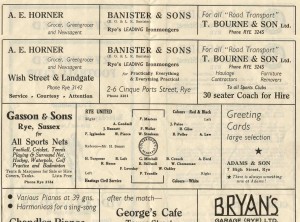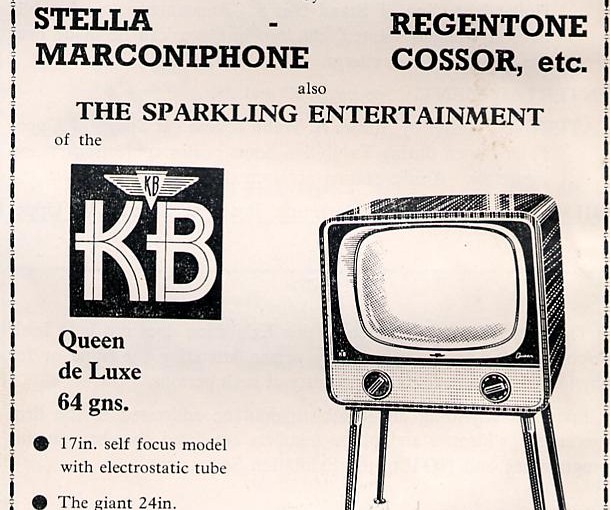This publication has always been known for its high ‘nostalgia’ content. Why do our readers enjoy these articles, pictures and memories from the past?
Perhaps it is because they are reminded of their ‘halcyon days’ or could it just be that those less complicated times were better days to live through?
Take the 1950’s. Very few homes had televisions. Tape recorders were not available to the general public until the very end of the decade, videos were unheard of 45 rpm vinal was replacing the old fragile 78rpm records and 12″ long players at 33rpm (albums) were also introduced.
Today every human being over the age of five, and some well under that tender age, have either a mobile phone, Ipad, tablet or laptop computer, many have one of each! Why were children of the 1950’s not bored without these modern day necessities? Because there was so much to do.
The War had been over for five years when the half century came round. There were fields to explore, war wreckage to examine, aeroplanes to spot and wonder over. Biggles books to read, inpromtu football matches to play, old bikes to ride, birds nests to plunder, apples to be ‘scrumped’, fish to be caught in the river. In the winter they waited for snow, then made a dash for the hills where makeshift sledges charged down the steep slopes at ever increasing speed until, inevitably the occupant was discharged into the snow.
Swimming and sunbathing in the sea at Hythe, Dymchurch, Littlestone, Camber, Winchelsea Beach, Fairlight and Hastings and even in the lakes near Camber Castle were popular in the summer holidays. Health and Safety would have had a nightmare if they had existed in those days. Children allowed to roam the countryside all day, wartime hazards lying about all over the place, huge trees where boys out-climbed each other to get to Rooks nests, Camber Castle, wide open was a veritable children’s playground and climbing challenge.
There was money to be made. Sutton’s Yard at Rye and many similar establishments in every town bought all kinds. Newspaper, bottles, metal, rags, even rabbit skins. This was recycling at its best – No plastic about in those days to pollute the countryside and 100’s of children cleaning up war waste, copper was a favourite and found in great quantities where aircraft had crashed.
As the years passed money became much easier to earn. Youngsters left school at 15 and jobs were plentiful. Britain was prospering and by 1959 there were new council houses available for most that needed them and an era of prosperity beckoned as the Cinque Ports Towns moved into the 1960’s.

By 1960 the world of melody was changing. slow ballads and love songs suitable for ballroom dancing were being replaced by a new kind of music and dance, ‘Rock and Roll’ heralded a new era of dance and music and took the Saturday night dance into a new era. Cliff Richard and Elvis Presley dominated the ‘hit parade’. and dance halls echoed to the sound of Bill Haley and the Comets. Rocking around the Clock.
National Service was coming to an end and the weekly number of young Ryers setting off ‘back to camp’ dwindled away to nothing.
It was a time of full employment, Harold Macmillan was Prime Minister and his election slogan “You never had it so good” rang true with the greater portion of the population.
Factories were working flat out to supply the British people with the goods they needed and could afford with their new found wealth.
After the terrible depression of the thirties the war with all its sacrifices and deprivation in the forties and the lack of production in the early fifties due to the change from armament production to supplying peacetime commodities, the late fifties and early sixties saw a boom on the high streets of the land.
The goods on sale at this time, including Televisions, Washing Machines, Fridges and Freezers, Transistor Radios, Tape Recorders and other electrical appliances, were being produced almost exclusively in Britain.
You could get 5 gallons of petrol (23 litres) for One Pound in 1963. A packet of 20 Senior service cigarettes was less than 5np. Petrol works out at around £6 a gallon (4.5 litres) today and a packet of 20 cigarettes is over £6.
1963 saw the entry of The Beatles to the music charts and a new Labour Government, led by Harold “Pound in Your Pocket” Wilson.
The boom was over, the pound devalued, and soon ‘retail price maintenance’ would be abolished, leading to the expansion of supermarkets. This was to be the beginning of the end for the traditional High Street shop.
From the September 2014 issue of “Rye’s Own”
All articles, photographs and drawings on this web site are World Copyright Protected. No reproduction for publication without prior arrangement. © World Copyright 2015 Cinque Ports Magazines Rye Ltd., Guinea Hall Lodge Sellindge TN25 6EG
